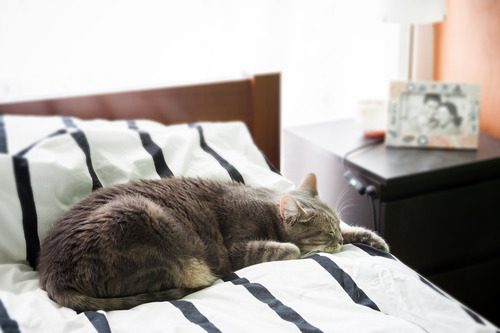Why Your Cat Pees on Your Bed
Discovering that your cat has decided to use your bed as a bathroom can be both distressing and perplexing. This behavior not only affects your living space but also raises concerns about your cat’s health and well-being. At Whitney Veterinary Hospital in Peoria, IL, we often hear from concerned pet owners about this issue. This blog aims to shed light on some common reasons why your cat might be peeing on your bed and what steps you can take to address it. Remember, if this problem persists, it’s essential to consult with a veterinarian. You can reach us at (309) 685-4707 for more guidance.

Understanding the Behavior
Health Issues
One of the first steps in addressing your cat peeing on the bed is to rule out health problems. Cats suffering from urinary tract infections, kidney disease, or diabetes may begin to urinate outside the litter box. This is because these conditions can make urinating painful or more frequent, leading your cat to associate the discomfort with their litter box and avoid it. If you notice any additional symptoms like increased drinking, vocalizing, or lethargy, it’s crucial to get your cat examined by a vet immediately.
Stress and Anxiety
Cats are creatures of habit and can become stressed or anxious due to changes in their environment. This can include new pets, new people, or even changes in your daily routine. Stress can lead to inappropriate urination as a way of marking territory or as a reaction to feeling insecure. Pay attention to recent changes in your household that might be affecting your cat’s emotional well-being.
Behavioral Reasons
Territorial Marking
Your bed carries your scent, and for cats, that makes it a prime spot for marking territory. This is more common in homes with multiple pets where there may be competition for space and resources. Cats may pee on your bed to intermingle their scent with yours, establishing a shared territory or asserting dominance.
Issues with the Litter Box
Sometimes the problem is as simple as the litter box itself. Whether it’s not being cleaned frequently enough, located in an undesirable part of the house, or filled with a type of litter your cat dislikes, these can all lead your cat to seek other places to relieve themselves. Evaluate your litter box setup to ensure it meets your cat’s needs and preferences.
Preventive Measures and Solutions
- Improve Litter Box Conditions: Ensure that you have enough litter boxes in your home (the general rule is one per cat, plus one extra) and that they are kept clean and in quiet, accessible locations. You might also experiment with different types of litter to find one that your cat prefers.
- Environmental Enrichment: Provide a stimulating environment for your cat that includes opportunities for play, scratching, and resting. This can help reduce stress and prevent behavioral issues. Consider using pheromone diffusers, which can help to soothe anxious pets.
- Behavioral Training: Sometimes, retraining your cat to use the litter box can help resolve the issue. This might involve restricting access to the bed until the behavior is under control and gradually reintroducing them once they are using the litter box consistently.
- Consult a Professional: If the problem persists despite your best efforts, it may be necessary to consult with a veterinarian or a feline behaviorist. They can provide specialized insight and possible treatments tailored to your cat’s needs.
Guidance on Improving Your Cat’s Comfort
If your cat pees on your bed, it’s a sign that they might be experiencing health issues, stress, or dissatisfaction with their litter box. By understanding the potential causes and taking appropriate steps, you can help your cat overcome this troubling behavior. For more personalized advice, call us at Whitney Veterinary Hospital at (309) 685-4707. We’re here to help ensure your cat’s health and happiness.
